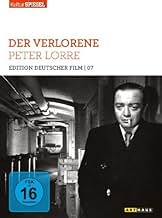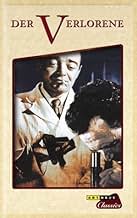PUNTUACIÓN EN IMDb
7,0/10
1,2 mil
TU PUNTUACIÓN
Un científico alemán asesina a su prometida durante la Segunda Guerra Mundial cuando se entera de que ella ha estado vendiendo los resultados de su investigación secreta al enemigo.Un científico alemán asesina a su prometida durante la Segunda Guerra Mundial cuando se entera de que ella ha estado vendiendo los resultados de su investigación secreta al enemigo.Un científico alemán asesina a su prometida durante la Segunda Guerra Mundial cuando se entera de que ella ha estado vendiendo los resultados de su investigación secreta al enemigo.
- Dirección
- Guión
- Reparto principal
- Premios
- 1 premio y 1 nominación en total
Helmuth Rudolph
- Colonel Winkler
- (as Helmut Rudolph)
Eva Ingeborg Scholz
- Ursula Weber
- (as Eva-Ingeborg Scholz)
Peter Ahrweiler
- Oberstleutnant Marquardt
- (sin acreditar)
Josef Dahmen
- Lieske, canteen bartender
- (sin acreditar)
Helmut Eichberg
- Oberstleutnant Bydersahn
- (sin acreditar)
Kurt Fuß
- Baldheaded Man
- (sin acreditar)
Joachim Hess
- Leutnant
- (sin acreditar)
Richard Münch
- Criminal Inspector #1
- (sin acreditar)
Reseñas destacadas
After years of dreary labor in Hollywood as a professional "evil foreigner," Lorre went home to Germany to write, direct and star in this dark, dreamlike narrative in which he plays the ultimate Peter Lorre character: a Nazi mad doctor sex murderer. The film is an ironic commentary by Lorre, the reluctant impersonator of psychopaths, on the nature of true psychopathology as embodied in the amoral Nazi regime. It's also an ingenious melding of the sort of B-film noir that Lorre had specialized in for years as an actor (Maltese Falcon, Stranger on the Third Floor, Quicksand) and the impressionistic Nouvelle Roman/Nouvelle Vague influenced art film just picking up steam on the continent (shades of Orpheus, Wild Strawberries, and Last Year at Marienbad can be seen in its shadowy enfolding of past/present and dream/reality.) Though somewhat uncertain in balancing himself between his roles as principal actor and director (the motivations of some of the other characters are somewhat murky, for instance, and it's rather a shock to see Peter Lorre so continually being the object of women's lustful attentions) this was clearly a man with the makings of an ingenious and original filmmaker. It's a shame this film isn't better known, and that Lorre never got the chance to make another.
Somehow Peter Lorre wanted to make a comeback in post war Germany with this movie. He plays the principal role in Der Verlorene, a little guy stumbling through the Nazi years in Germany and ending up just wanting to put an end to his life (apparently based on a true story). He also directed and participated in the screen writing. And that was probably too much. The movie is ill paced and takes several unexpected turns which break down the narrative rhythm. The movie also seems to shift in an uneasy way into different genres. It starts out as a solid firm noir with a flashback, a love story, betrayal and a murder. Then Lorre reverts to his role in Fritz Lang's M and becomes a psychotic woman hater and mass murderer. Then, back in the noir mode, he stumbles inadvertently into the preparation for the assassination of Hitler (a real event that took place in 1944) and, believe it or not, the movie definitely becomes a kind of a black comedy. The main character ends up a tragic clown who can not be taken seriously (and I am pretty sure it was not meant that way). Some plot details are plainly ludicrous and do not work. An example: Lorre's character takes to strangling women who try to "make him hot". They are decidedly bigger and larger than he is and all look as if they would put up fierce resistance against a strangling Lorre, probably easily overpowering him. But they react like frightened lambs I just had to laugh at that, or was I missing a crucial symbolic twist here? However, other aspects of the movie are interesting. The theme of betrayal and double cross are cleverly presented as the essence of every day life in Nazi Germany. The set design and the scenes shot on location somewhere in Germany create an oppressive atmosphere with darkened parlours, basement laboratories, bleak apartments and landscapes of ruins and emergency shelters. Actually, all the elements that make a good movie are there and in itself well presented: some good dialogue, the observation, the surprise moments, the suspense and even a car chase. There are some very good female parts. The game of flirting and sexual innuendo is presented in a frankness that was pretty drastic for the period, I guess. But these elements stand by themselves and unfortunately don't come together to form a good movie. Robert Siodmak's thematically related movie Nachts, wenn der Teufel kam was a much more convincing comeback with a film that transports American noir mode to Nazi Germany.
Following a period of rehabilitation where he managed to beat his addiction to morphine, character actor extraordinaire Peter Lorre felt confident enough not only to leave his secure employment as a lean, sleek villain in myriad Hollywood noirs and go back to his native Germany after almost 20 years (which, like many compatriots, he had fled when the Nazis came to power) but also to embark on his sole foray behind the camera. Adopting an unfussy technique but a compelling flashback structure, Lorre turned out a truly remarkable piece of work that, equally unsuccessful on its first release as Charles Laughton's THE NIGHT OF THE HUNTER (1955) and Marlon Brando's ONE-EYED JACKS (1961), has yet to have its somewhat maligned reputation vindicated in the same unequivocal manner as these two 'one-hit wonders' by actors-turned-directors. A chubbier, infinitely world-weary Lorre gives a haunting central performance as the dedicated, real-life scientist Dr. Karl Rothe who, being told by his superiors that his discoveries were being passed on to the allied forces by his beautiful (and much younger) fiancée, strangles her in a moment of silent rage upon returning to the lodgings he shares with his mother-on-law and her cat; the actress playing Lorre's first victim (Renate Mannhardt) makes such an indelible impression on the spectator that, upon a second viewing, one is surprised to discover how brief her appearance in the film actually is. Changing his identity and now serving as a medical doctor in a refugee camp, Lorre is brought once again face to face with his inner demons in the shape of his assistant during WWII who, apart from having carried on an affair with Lorre's wife, was secretly also an important Party official investigating the infamous "Night Of The Long Knives" conspiracy (which is rather murkily dealt with in the film's latter stages); another enigmatic aspect of Lorre's personality that is somewhat oddly thrown into the mix is his troubled dealings with other women over the years, culminating in another murder committed in a stationary train carriage. Interestingly, the film opens with a shot of a moving train out of which emerges the tiny figure of Lorre walking towards the refugee camp and ends in a devastating medium shot of Lorre, one hand clasped dejectedly to his face, standing stationary on the railroad tracks as a locomotive rushes headlong in his direction! As one can surmise from this synopsis, THE LOST ONE's lack of critical and commercial success ought to be attributed more to its utter grimness and thoroughly defeatist view of post-war Germany than to any jinx the production might have been vested with (the film's producer, Arnold Pressburger, died in mid-production, the original negative was lost in an editing suite fire and the film survives via a reconstructed print, etc.) and, indeed, should be much better known even among film connoisseurs. Personally, I had first come across a copy of the film at a priceless DVD rental store on Santa Monica Blvd. in Hollywood in January 2006 but I have since added it to my collection in a seemingly restored version (albeit sporting distractingly ungrammatical English subtitles).
10vferenz
Der Verlorene is an extraordinary film noir not only as text but also in its context. This film disappeared after only ten days from german screens although most critics said that it´s the best german film after WW II. The reasons are very simple: First, it was too late. This film five years earlier in 1946 would have been the Trümmerfilm par excellance. Compare it to Die Mörder sind unter uns and you will see the huge difference. Second, in the upcoming era of Wirtschaftswunder no one in whole Western Germany wanted a reminder on what their industry and morality was build on: the Third Reich. Consider this, when Marlene Dietrich came back to Germany many people shouted: Go home! In the 1950s one producer said about Fritz Kortner: Hitler could have burnt more Jews. This way of thinking wasn´t elimated and still it´s not. Nowadays WW II is good for action flics (Saving Private Ryan and all this crap) or love stories (for example this desaster Enemy at the Gates). It´s depressing but one shouldn´t get mad over it. Just see Der Verlorene and you will see there were people how to handle this topic in an adequate manner. Maybe there are some filmmakers out there who still know. Let´s hope for it.
10pyamada
Lorre, perhaps like Charles Laughton, had only this chance to direct. Like Laughton, Lorre made an excellent film, and encountered no problems whatsoever concerning complete control of the film, unlike Laughton, whose film was given a crude ending as a gift from the studio. This is a beautiful, poetic movie about horrible subjects, and the complicated reactions and perspectives one will have about these characters, especially Lorre's, teaches us much about Germany, the Nazis and aspects of the war in general. While there are passing similarities in content to Wilder's A Foreign Affair, Die Verlorne is so much the better movie, so much more poetic (perhaps than anything Wilder ever did), and so moving, in brutal ways, that it just has to be considered one of the best and most powerful and most depressing films ever made.
¿Sabías que...?
- CuriosidadesPeter Lorre's only film as director
- Créditos adicionalesExplanatory caption (in German) in opening credits: This film is not a work of fiction. The events are based on factual reports from the last few years.
- Versiones alternativasThere is an Italian edition of this film on DVD, distributed by DNA srl, "UN UOMO PERDUTO (1951) + CRIME AND PUNISHMENT (Ho ucciso!, 1935)" (2 Films on a single DVD), re-edited with the contribution of film historian Riccardo Cusin. This version is also available for streaming on some platforms.
- ConexionesFeatured in Displaced Person - Peter Lorre und sein Film 'Der Verlorene' (2007)
Selecciones populares
Inicia sesión para calificar y añadir a tu lista para recibir recomendaciones personalizadas
Detalles
- Duración1 hora 38 minutos
- Color
- Mezcla de sonido
- Relación de aspecto
- 1.37 : 1
Contribuir a esta página
Sugerir un cambio o añadir el contenido que falta
















